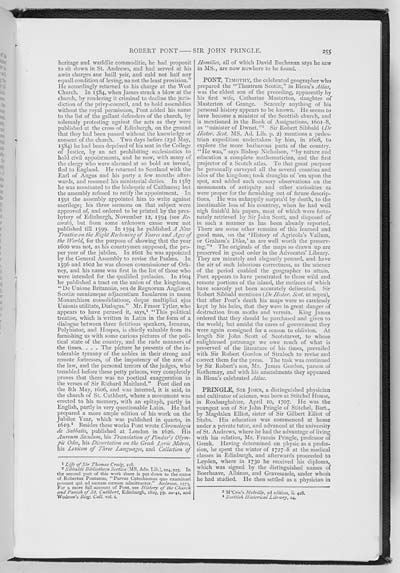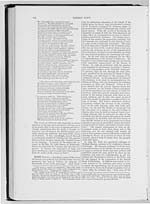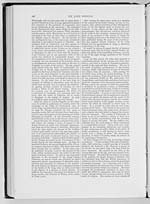Volume 3 > Half-Volume 5
(268) Page 255 - Pont, Timothy
Download files
Individual page:
Thumbnail gallery: Grid view | List view

255 heritage and warldlie commoditie, he had proponit to sit down in St. Andrews, and had served at his awin charges ane haill yeir, and culd not haif any equall condition of leving, na not the least provision." He accordingly returned to his charge at the West Church. In 1584, when James struck a blow at the church, by rendering it criminal to decline the juris- diction of the privy-council, and to hold assemblies without the royal permission, Pont added his name to the list of the gallant defenders of the church, by solemnly protesting against the acts as they were published at the cross of Edinburgh, on the ground that they had been passed without the knowledge or consent of the church. Two days before (23d May, 1584) he had been deprived of his seat in the College of Justice, by an act prohibiting ecclesiastics to hold civil appointments, and he now, with many of the clergy who were alarmed at so bold an inroad, fled to England. He returned to Scotland with the Earl of Angus and his party a few months after- wards, and resumed his ministerial duties. In 1587 he was nominated to the bishopric of Caithness; but the assembly refused to ratify the appointment. In 1591 the assembly appointed him to write against sacrilege; his three sermons on that subject were approved of, and ordered to be printed by the pres- bytery of Edinburgh, November 12, 1594 (see Re- cords), but from some unknown cause were not published till 1599. In 1594 he published A New Treatise on the Right Reckoning of Yeares and Ages of the World, for the purpose of showing that the year 1600 was not, as his countrymen supposed, the pro- per year of the jubilee. In 1601 he was appointed by the General Assembly to revise the Psalms. In 1596 and 1602 he was chosen commissioner of Ork- ney, and his name was first in the list of those who were intended for the qualified prelacies. In 1604 he published a tract on the union of the kingdoms, "De Unione Britanni�, seu de Regnorum Angli� et Scoti� omniumque adjacentium Insularum in unam Monarchiam consolidatione, deque multiplici ejus Unionis utilitate, Dialogus." Mr. Eraser Tytler, who appears to have perused it, says,1 "This political treatise, which is written in Latin in the form of a dialogue between three fictitious speakers, Iren�us, Polyhistor, and Hospes, is chiefly valuable from its furnishing us with some curious pictures of the poli- tical state of the country, and the rude manners of the times. . . . The picture he presents of the in- tolerable tyranny of the nobles in their strong and remote fortresses, of the impotency of the arm of the law, and the personal terrors of the judges, who trembled before these petty princes, very completely proves that there was no poetical exaggeration in the verses of Sir Richard Maitland." Pont died on the 8th May, 1606, and was interred, it is said, in the church of St. Cuthbert, where a monument was erected to his memory, with an epitaph, partly in English, partly in very questionable Latin. He had prepared a more ample edition of his work on the Jubilee Year, which was published in quarto, in 1619.2 Besides these works Pont wrote Chronologia de Sabbatis, published at London in 1626. His Aureum Seculum, his Translation of Pindar's Olym- pic Odes, his Dissertation on the Greek Lyric Metres, his Lexicon of Three Languages, and Collection of 1 Life of Sir Thomas Craig, 218. 2 Sibbaldi Bibliotheca Scotica (MS. Adv. Lib.), 224,225. In the second part of this work there is put down to the name of Robertus Pontanus, "Parvus Catechismus quo examinari possunt qui ad sacram ccenam admittuntur." Andrean. 1573. For a more full account of Pont, see History of the Church and Parish of St. Cuthbert, Edinburgh, 1829, pp. 20-41, and Wodrow's Biog. Coll. vol. i. Homilies, all of which David Buchanan says he saw in MS., are now nowhere to be found. POET, TIMOTHY, the celebrated geographer who prepared the "Theatrum Scotise," in Bleau's Atlas, was the eldest son of the preceding, apparently by his first wife, Catharine Masterton, daughter of Masterton of Grange. Scarcely anything of his personal history appears to be known. He seems to have become a minister of the Scottish church, and is mentioned in the Book of Assignations, 1601-8, as "minister of Dwnet."3 Sir Robert Sibbald (De Histor. Scot. MS. Ad. Lib. p. 2) mentions a pedes- trian expedition undertaken by him, in 1608, to explore the more barbarous parts of the country. "He was," says Bishop Nicholson, "by nature and education a complete mathematician, and the first projector of a Scotch atlas. To that great purpose he personally surveyed all the several counties and isles of the kingdom; took draughts of 'em upon the spot, and added such cursory observations on the monuments of antiquity and other curiosities as were proper for the furnishing out of future descrip- tions. He was unhappily surpris'd by death, to the inestimable loss of his countrey, when he had well nigh finish'd his papers, most of which were fortu- nately retrieved by Sir John Scott, and disposed of in such a manner as has been already reported. There are some other remains of this learned and good man, on the 'History of Agricola's Vallum, or Graham's Dike,' as are well worth the preserv- ing."4 The originals of the maps so drawn up are preserved in good order in the Advocates' Library. They are minutely and elegantly penned, and have the air of such laborious correctness, as the science of the period enabled the geographer to attain. Pont appears to have penetrated to those wild and remote portions of the island, the surfaces of which have scarcely yet been accurately delineated. Sir Robert Sibbald mentions (De Histor. Scot, ut supra), that after Font's death his maps were so carelessly kept by his heirs, that they were in great danger of destruction from moths and vermin. King James ordered that they should be purchased and given to the world; but amidst the cares of government they were again consigned for a season to oblivion. At length Sir John Scott of Scotstarvet, to whose enlightened patronage we owe much of what is preserved of the literature of his times, prevailed with Sir Robert Gordon of Straloch to revise and correct them for the press. The task was continued by Sir Robert's son, Mr. James Gordon, parson of Rothemay, and with his amendments they appeared in Bleau's celebrated Atlas. PRINGLE, SIR JOHN, a distinguished physician and cultivator of science, was born at Stitchel House, in Roxburghshire, April 10, 1707. He was the youngest son of Sir John Pringle of Stitchel, Bart., by Magdalen Elliot, sister of Sir Gilbert Elliot of Stobs. His education was commenced at home under a private tutor, and advanced at the university of St. Andrews, where he had the advantage of living with his relation, Mr. Francis Pringle, professor of Greek. Having determined on physic as a profes- sion, he spent the winter of 1727-8 at the medical classes in Edinburgh, and afterwards proceeded to Leyden, where in 1730 he received his diploma, which was signed by the distinguished names of Boerhaave, Albums, and Gravesande, under whom he had studied. He then settled as a physician in 3 M'Crie's Melville, 2d edition, ii. 428. 4 Scottish Historical Library, 24.
Set display mode to:
![]() Universal Viewer |
Universal Viewer | ![]() Mirador |
Large image | Transcription
Mirador |
Large image | Transcription
Images and transcriptions on this page, including medium image downloads, may be used under the Creative Commons Attribution 4.0 International Licence unless otherwise stated. ![]()
| Biographical dictionary of eminent Scotsmen > Volume 3 > Half-Volume 5 > (268) Page 255 - Pont, Timothy |
|---|
| Description | Spine title: Half-Vol. V. Macadam to Smith. |
|---|---|
| Description | Volume III. Contains names alphabetically from Macadam to Young. |
|---|

